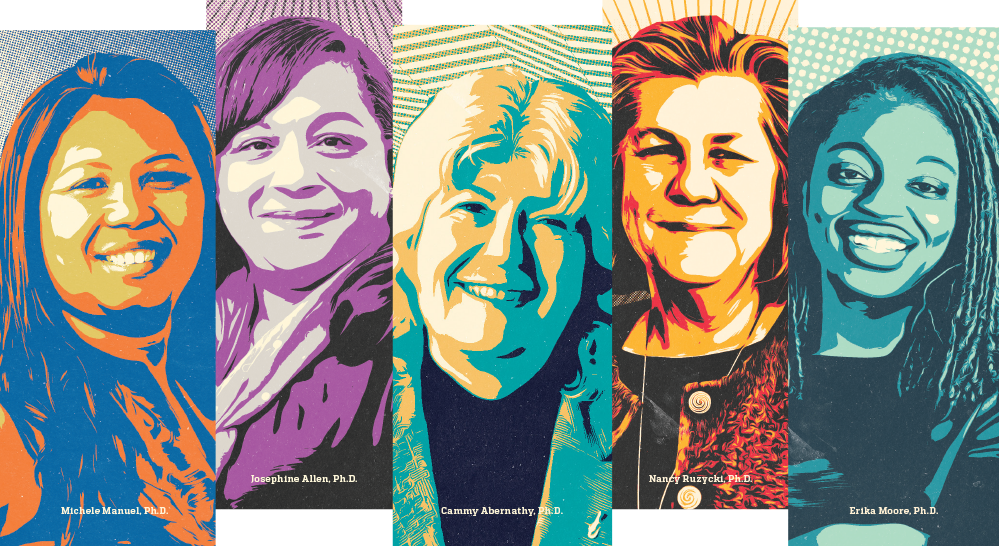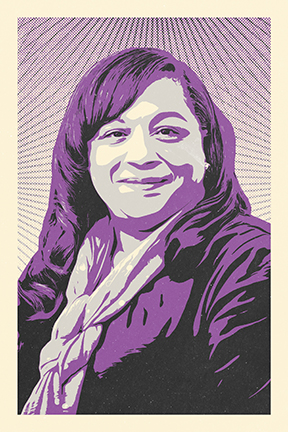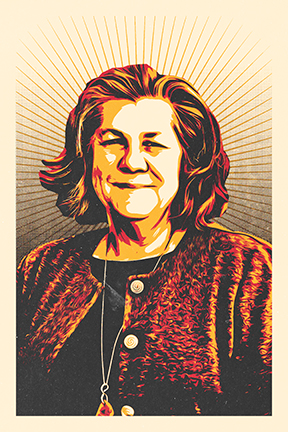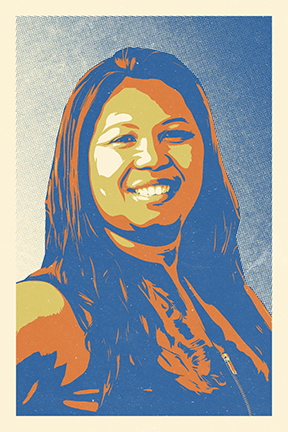Inequality in science and engineering can have lasting impacts across race, gender and ethnicities that go unnoticed for decades – yet affect treatments and solutions used every day. Now, faculty members in the Department of Materials Science & Engineering aim to shine a light on some of these knowledge gaps and help rectify the problems they create.
Mending the Gaps
By definition, a gap is an “incomplete or deficient area.” For instance, in a scientific study, a literature gap represents unexplored sections in the data and an opportunity for further analysis or investigation.
The equity gaps that have permeated cultures, industries and communities throughout history are undeniable, and science, including its branches of research and education, is not exempt. With their insight, experience and analysis to guide them, Josephine Allen, Ph.D., Erika Moore, Ph.D., Nancy Ruzycki, Ph.D., and Michele, Manuel, Ph.D., are not only identifying, but also helping bridge some of the science, research and cultural equity gaps they’ve encountered.
The Data Gap
Josephine Allen, Ph.D., associate professor and Genzyme Professor of Materials Science & Engineering, addresses inequity not only in her research but also how it affects the raw data she uses in it. Dr. Allen and her team observed that biomedical researchers and the journals publishing their papers rarely mentioned the sex of the cells involved in the studies.
“Sex-based differences have been a long-standing interest of mine and are the primary reason I work in the area of cardiovascular disease – particularly its disproportionally negative effects on women, and African American women, in particular,” said Dr. Allen. “My interest is fueled by the overwhelming evidence that male and female biology is different, and these biological differences translate to disparities in health, disease and also treatments.”
“I viewed it as a chance to make a real difference” – Josephine Allen, Ph.D.
Their literature survey of several top biomedical journals and found that cell sex was reported in only a small fraction (roughly 3%) of papers.
That information prompted their own paper highlighting the findings entitled “Let’s Talk About Sex – Biological Sex is Underreported in Biomaterials Studies.” Dr. Allen and her team then submitted a comprehensive review highlighting underreported cell sex data.
“I thought about all of the new insight that could be gained, how studies could be more easily replicated and how, as a field, we have an opportunity to shift research from being inadvertently biased towards male biology – simply because of the greater likelihood of obtaining male cells from a commercial vendor, to becoming more representative of the population as a whole. I viewed it as a chance to make a real difference.”
The Disparity Gap
Inequities also exist in many diseases, including cancers, cardiovascular diseases and mental health disorders. Unfortunately, the current lack of sample collection and background testing on cells from non-European ancestral backgrounds limits the development of new therapeutics for diseases that disproportionately affect diverse backgrounds.
Erika Moore, Ph.D., assistant professor and holder of the Rhines Rising Star Larry Hench professorship, sees both ancestral and sex-based disparities in her research into lupus, an autoimmune disorder.
“As an African American woman knowing several friends and loved ones who suffer from lupus, I am particularly aware of its statistical divergences,” said Dr. Moore. “Given the biomaterial models I have available, it became of great personal interest to me to study this disease and focus my research efforts towards identifying the reasons behind these disparities.”
Of the estimated 1.5 million Americans and over 5 million people worldwide suffering from lupus, 90% are women. There is currently no cure.
“Not only does lupus overwhelmingly affect women, but it’s also two to three times more prevalent in women of color,” said Dr. Moore. “My lab’s work explores not only why it’s mostly women, but we also delve into the significant disparity between lupus in women of African ancestry and women of European ancestry.”
Although the biomedical engineering field has made considerable progress on its mission of utilizing engineering to advance human health and improve overall well-being, Dr. Moore feels its full potential will not be met until that progress benefits all populations.
“Health disparities disproportionately impact vulnerable or marginalized populations in the United States. It is my goal to leverage my research to ask questions about these overlooked segments and the diseases that develop disproportionately within them,” said Dr. Moore. “These types of questions are critical for biomedical sciences and biomaterial models. As scientists and as engineers, we must ask ourselves whose health we consider with our research?”
The Funding Gap
Dr. Allen is also taking a stand on funding inequity for researchers of color, co-authoring a paper with 18 other scientists, calling upon the National Institutes of Health and other funding agencies to address disparities in allocating support to Black researchers.
“As a Black faculty member who relies heavily on NIH funding to advance my research program and, ultimately, my career, this paper means so much to me. It is filled with reasonable action items and policy changes that can address this funding disparity,” said Dr. Allen, Ph.D. “This paper articulates what many Black faculty are feeling and experiencing in academia.”
According to studies of National Institutes of Health research funding allocations, Black applicant award rates have stood at about 55 percent of that of white principal investigators of similar academic achievement. Despite internal reviews of the reasons behind this disparity and promises to do better, the funding gap continues.
The paper, entitled Fund Black Scientists, recommends several ways on how research funding disparities can be eliminated, including:
- Explicitly state that racism persists in the United States research enterprise and that it must be expelled
- Develop federal funding institute policies to achieve racial funding equity immediately
- Incorporate diversity into research proposal scoring criteria, prioritize research teams that exemplify diversity, and diversify proposal review panels
- Train funding agency leadership and staff, and grant reviewers and recipients, to recognize and stop racism
As a group, the paper’s authors also suggested ways individual scientists and universities, colleges and institutes can act to bring about social justice. These recommendations include recognizing how they might be unintentionally contributing to systemic racism in their academic roles. Academia, they noted, must move forward from statements of solidarity to transformative organizational changes.
The Education Gap
Florida students are taught science, technology, engineering, and mathematics (STEM) subjects as early as elementary school. Still, with an ongoing teacher shortage and over 25% of educators in classrooms not holding education degrees or degrees in the fields they teach, more teachers and more rigorous teacher training are needed to prepare those students to join tomorrow’s workforce. Nancy Ruzycki, Ph.D., instructional associate professor, addresses this gap with a “Supporting Effective Educator Development” (SEED) grant awarded to her by the U.S. Department of Education.
The SEED grant, written to help teachers build their STEM core content and deliver research/evidence-based pedagogical practices in the classroom, funded the Engaged Quality Instruction through Professional Development (EQuIPD) program. Designed to improve the pedagogy of STEM learning among K-9 students, EQuIPD deployed in 11 Florida counties whose districts account for over 30% of elementary schools on the state’s lowest 300 list and contain 12 schools listed as persistently underperforming according to the Florida Department of Education in 2017.
“This program strengthens the STEM pipeline for all students so we gain more diversity in STEM fields.” – Nancy Ruzycki, Ph.D.
“The EQuIPD program exposes teachers to new approaches in classroom instruction,” Dr. Ruzycki said. “They learn about using model concept development practices to help structure classes for all learning levels, utilizing technology to collect and analyze data and refining and deploying their lessons into real-world applications.
A recent independent assessment revealed the program’s impressive impact among Florida teachers. The survey results found that teachers with EQuIPD training are implementing more technology and computational thinking in their classrooms and using real-world problems to help develop workforce skills in their students. They also have better knowledge of local STEM resources and employ design and systems thinking with engineering design in their classes and lessons.
“It is clear the EQuIPD program has had a significant impact on teacher practice for research-based teaching methods in the classroom,” said Dr. Ruzycki. “This program strengthens the STEM pipeline for all students so we can gain more diversity in STEM fields.”
The Recognition Gap
When Michele Manuel, Ph.D., chair of the Department of Materials Science & Engineering, earned her doctorate, finding other faces like hers was nearly impossible.
“When I graduated, the entire population of female, Black engineers holding Ph.D.’s was nearly non-existent – possibly even in the single digits,” said Dr. Manuel. “There was hardly anyone in my field who looked like me. And with so few colleagues with whom I could identify, it could feel a bit isolating at times. It can get easy to question if you actually belong.”
Now, as an internationally recognized expert in materials design and the first woman and person of color to hold the position of Department Chair in the department’s 60 plus-year history, Dr. Manuel champions for fundamental changes in the system – the changes that make a difference.
“There was hardly anyone in my field who looked like me. And with so few colleagues with whom I could identify, it could feel a bit isolating at times. It can get easy to question if you actually belong.” – Michele Manuel, Ph.D.
For example, one of her directives included removing standardized testing score requirements and implementing a more holistic system to evaluate the department’s graduate program applicants.
“Standardized tests are constructed in a way that makes them inherently biased against underrepresented groups, including socioeconomic, race, language and gender,” said Dr. Manuel. “By looking at more than just a test score, we get to know more about the students themselves, which we believe is a much better indicator of success potential than a grade from a single exam.”
She also helped forge a strategic partnership with the University of Puerto Rico – Mayaguez (UPRM) to provide their MSE students with a path to a UF doctorate degree.
“UPRM has a fantastic master’s program, but nothing beyond that, yet. For Latinx students who want to continue their research and studies, we felt it was important to establish a channel that would enable them to achieve their academic and professional goals as engineers,” said Dr. Manuel.
Dr. Moore also knows what it’s like when the microaggressions of others make you feel like you don’t belong. While she has always loved research and education, she also can’t recall an instance when she walked into a classroom or a lab, and there weren’t hushed whispers or subtle questioning of why she was there.
“When I was younger, my father often told me that I had two things working against me: I’m a woman, and I’m Black. So, when others questioned my presence somewhere, it seeded doubt within me,” said Dr. Moore. “I eventually realized that the only way to create a space for Black women who felt similarly othered or similarly uncomfortable walking into classrooms or laboratories was to become a leader in those classrooms and those laboratories.”
“Being a Black woman in these spaces gives me the voice to confirm to everyone that we are indeed capable and that we most definitely belong.” – Erika Moore, Ph.D.
When Dr. Moore signed her acceptance letter to teach at the University of Florida in 2017, African American women held just over 0.5% of tenure-track engineering positions in the United States. While the University of Florida now leads the country in tenured and tenure-track African American female faculty, much more work remains to be done.
It’s a responsibility she does not take lightly.
“I understand that I am here to continue to change the landscape of science and engineering. I know that it will not be easy and that my journey forward from here will have moments of uncertainty. But being a Black person – being a Black woman, in these spaces gives me the voice to confirm to everyone that we are indeed capable and that we most definitely belong.”
Dean Cammy Abernathy Selected as 2022 TMS Ellen Swallow Richards Diversity Award Winner
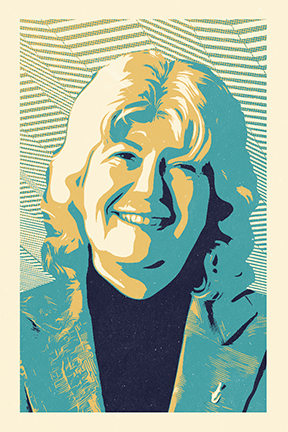
The Minerals, Metals & Materials Society (TMS) has selected Cammy R. Abernathy, Ph.D., Dean of the Herbert Wertheim College of Engineering, as the 2022 TMS Ellen Swallow Richards Diversity Award winner. This honor, inspired by Ellen H. Swallow Richards, recognizes a member of the minerals, metals and materials community who has helped or inspired others to overcome personal, professional, educational, cultural, or institutional adversity to pursue a career in minerals, metals, and/or materials.
In addition to her seminal contributions in compound semiconductor processing, TMS is recognizing Dean Abernathy for her ongoing efforts to eliminate institutional barriers and setting the standard for equity and inclusion in higher education, and leading the College with distinction by fueling a culture of diversity and inclusion, entrepreneurship, interdisciplinary education, and leadership.
Dean Abernathy received her S.B. degree in materials science and engineering from the Massachusetts Institute of Technology (MIT) in 1980 and her M.S. and Ph.D. degrees in materials science and engineering from Stanford University in 1982 and 1985, respectively. She joined the University of Florida’s Department of Materials Science & Engineering as a professor in 1993. In 2004, she became the college’s Associate Dean for Academic Affairs and, in July 2009, was appointed Dean of the then College of Engineering.
As Dean, she would hire an unprecedented number of faculty and administrators, transforming not only the face of the college but also the culture and environment by recruiting diverse top talents toward tenure/tenure-track and lecturer positions. In 2020, the ASEE Diversity Recognition Program featured the Herbert Wertheim College of Engineering as an “Exemplar of Diversity, Equity, and Inclusion.”
“Dean Abernathy has been the guiding light to so many individuals, including myself. Her visionary leadership, gravitas and compassion have personally inspired numerous people,” said Michele Manuel, Ph.D., chair of the Department of Materials Science & Engineering. “I can only hope to inspire others and make personal sacrifices in the ways she continues to do, and I cannot think of a more deserving candidate for the Ellen Swallows Richards Diversity Award than Dean Cammy R. Abernathy.”
Dean Abernathy has authored over 500 journal publications, over 430 conference papers, co-authored a book, edited seven books, eight book chapters, and holds seven patents.
Dean Abernathy is a fellow of the Materials Research Society, the American Association for the Advancement of Science, AVS: Science and Technology of Materials, Interfaces and Processing, the American Physical Society, and the Electrochemical Society. She is also the Chair of the American Society of Engineering Education’s Engineering Deans Council.
Ellen H. Swallow Richards (1842 – 1911) was the first woman to be admitted to and graduate from MIT. Richards was also the first female member of The American Institute of Mining, Metallurgical, and Petroleum Engineers. In 1875, while teaching chemistry at MIT, she also established the Women’s Laboratory for women scientists who at that time were not allowed in the laboratories. The Women’s Laboratory operated until 1883 when MIT began awarding bachelor’s degrees to women. Richards also spearheaded the unprecedented and widespread testing of Massachusetts waterways, streams, and lakes, which led to the establishment of the country’s first water quality standards and its first modern sewage treatment facility.
This coming spring in Anaheim, California, the award will be presented to Dean Abernathy at the TMS Annual Meeting.
TMS is a member-driven international professional society dedicated to fostering the exchange of learning and ideas across the entire range of minerals, metals, and materials science and engineering, from minerals processing and primary metals production to basic research and the advanced applications of materials.

